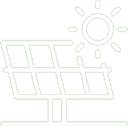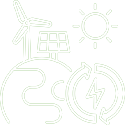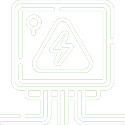How Solar Works

Sunlight Absorption
Solar panels, also known as photovoltaic (PV) panels, are installed on rooftops or in open spaces to capture sunlight. Each panel is made up of photovoltaic cells that absorb sunlight and convert it into direct current (DC) electricity.

Conversion to AC
The DC electricity generated by the solar panels is then converted into alternating current (AC) electricity using an inverter. AC electricity is the type of electricity used in homes and businesses.

Electricity Distribution
The AC electricity produced by the solar panels is either used immediately to power appliances and devices or sent to the electrical grid for distribution. When solar panels generate more electricity than is needed, the excess electricity can be exported to the grid, and the customer may receive credits for it through net metering programs.

Net Metering
Net metering allows solar panel owners to receive credit for excess electricity they generate and send back to the grid. This credit can offset electricity costs during periods of low solar production, such as at night.

Sunlight Absorption
Solar panels, also known as photovoltaic (PV) panels, are installed on rooftops or in open spaces to capture sunlight. Each panel is made up of photovoltaic cells that absorb sunlight and convert it into direct current (DC) electricity.

Conversion to AC
The DC electricity generated by the solar panels is then converted into alternating current (AC) electricity using an inverter. AC electricity is the type of electricity used in homes and businesses.

Electricity Distribution
The AC electricity produced by the solar panels is either used immediately to power appliances and devices or sent to the electrical grid for distribution. When solar panels generate more electricity than is needed, the excess electricity can be exported to the grid, and the customer may receive credits for it through net metering programs.

Net Metering
Net metering allows solar panel owners to receive credit for excess electricity they generate and send back to the grid. This credit can offset electricity costs during periods of low solar production, such as at night.
Our Solar Process

Quote
Get a comprehensive quote that includes costs, projected returns on investment, and personalized recommendations to help you make an informed decision.

SURVEY
Schedule a visit from one of our engineers to assess the feasibility and placement of solar modules at your site.

Design
Our in-house team of experts will design a solar system that meets your specific needs, using the latest industry-leading technology.

Installation
Sit back and relax as we take care of everything from planning to execution, ensuring a hassle-free and safe solar installation process.
How To Go Green

Install a solar energy system

Going Solar Is Easy

